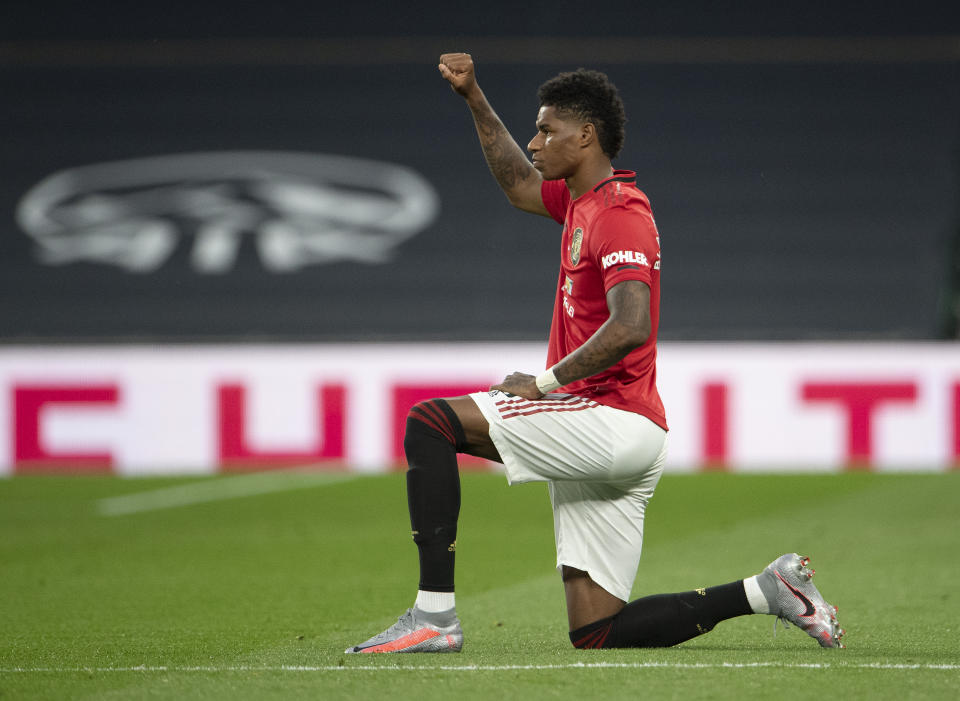Team GB will support athletes' collective decision to protest at Tokyo Olympics

British athletes have been urged to work with the International Olympic Committee to find an appropriate platform for protest at next year's Games in Tokyo, writes James Toney.
The Olympic movement has a muddied history when it comes to race relations, when American sprinters Tommie Smith and John Carlos famously raised their black-gloved fists in solidarity they were sent home from the 1968 Games in disgrace.
And athletes who wanted to speak out against Russia's appalling treatment of the LGBTQ community at the Winter Games in Sochi were only allowed to do so outside the supposed sanctity of an Olympic venue - which was tantamount to saying 'speak as long as we can't hear you'.
You have to appreciate the irony that an organisation as overtly political as the Olympics works so hard to prevent any athlete making political gestures.
But it is clear the IOC are pushing against the tide in the countdown to next year's reorganised Games.
However, as everyone from cricket umpires to F1 drivers, Premier League footballers to Nascar racers, take the knee, it is still sticking to its threat to ban athletes for following their lead in peaceful solidarity.
You can see why you need to be schooled in the art of diplomacy to front a team and Mark England, Team GB's chef de mission, has proven rather deft at dancing the tightrope.
You would be hard-pressed to find a sports administrator with a more groaning in-tray than the amiable England, who will need every one of the 365 days that remain before next year's rescheduled opening ceremony.
But the issue of political protest by athletes looms large over his plotting and planning.
"We would absolutely support athletes in whatever way they collectively choose to support Black Lives Matter," he said, the word collectively clearly being an important caveat.
"What is important is the British athletes have the opportunity to feed into what is right and appropriate to express that support. We are pushing our athletes' commission really hard to work closely with the IOC's athletes commission.
"Some may take the view that the field of play and the podium is sacrosanct but others may choose that actually it gives them the highest profile and therefore that is the right and appropriate place. We will listen to what comes out and create the right environment for that to happen."
It's 100 years since Harry Edward became the first black athlete to represent Great Britain at the Olympics - the original trailblazer that few have heard of.
Edward's story is remarkable, imprisoned throughout World War I in the notorious Ruhleben internment camp, the only son of a Guyanese father and German mother, he immigrated to Great Britain and won 100m and 200m bronze in Antwerp.
Four years later his 1920 team-mate Harold Abrahams won gold in Paris, inspiring the film Chariots of Fire, while Edward's contribution remains largely unknown, something history buff England is determined to change.
"We've got a century of black athletes being a hugely important and integrated component of Team GB," he adds.
"That’s what we are and what we stand for. Our differences are what make us special."

England admits he is sweating the detail of a logistical nightmare, rearranging flights and accommodation for nearly 400 athletes and the same number again in support staff while also renegotiating contracts for training facilities and preparation camps.
British Olympic success has been built on such forensic attention to detail and a relentless commitment to a strategy referred to as 'the aggregation of marginal gains'.
It's just 24 years since the nadir of Atlanta, where Britain mustered just 15 medals and a solitary gold and plummeted to 36th place on the medal table, way behind those swaggering Olympic newcomers from Kazakhstan, with their three golds in three different sports.
In the last three Games, thanks to the huge investment of the National Lottery, Team GB have won 51, 65 and 67 medals to finish fourth, third and second on the medal table respectively.
Tokyo was always going to present challenges in maintaining that level of performance, stars of London and Rio were starting to fade or had retired while Japan were expected to provide a much stronger home nation challenge than Brazil in Rio.
Managing expectations was the first page of England's playbook for Tokyo, leaving UK Sport to deal with the nitty gritty of medal predictions while setting an optimistic, yet realistic, tone for what lay ahead.
"I just wonder whether it’s time for the narrative to change slightly, given what’s happened in the world," added England.
"There’s 45,000 people that have died in this country and hundreds of thousands have died across the world and the pandemic is still ravaging through some parts of the world.
"Is it time for that narrative to change? Team GB athletes being role models for the British public and an opportunity that it’s not just medal focused.
"I’m hesitant to say ‘more than medals’ because that is churning out a strapline.
"But this is a real opportunity to see what’s right in this world and to see what is important and to reflect on that a little bit.
“If you ask me whether I think we’ll do well, yes I do. If you ask me whether we’ll win more medals than in Rio, it’s bloody tough."
Bloody tough? That's a very fair polite summation of England's year to come.

